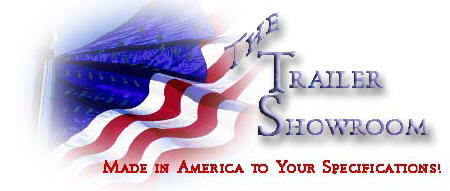Why Trailer Hitch Cost Varies
You have the towing vehicle and trailer; now, you need the hitch to connect them. A wrong hitch can lead to unstable, rough, and uncontrollable rides with disastrous consequences. The right hitch is essential to ensure safety, stability, and quality performance.
Selecting the right hitch requires you to factor in many aspects; trailer hitch cost is a prominent one. The price depends on the hitch type, class, weight capacity, and build material. Besides the hitch price, the cost of accessories and professional installation support are also critical factors.
We understand that the cost can go pretty high, but you cannot risk your journey's safety, stability, and efficiency. Once you invest in a quality hitch, you are guaranteed a high ROI and a longer lifespan. Not only do you save money in the long term, but the right hitch serves your towing needs for years to come.
The blog focuses on exploring the key factors and additional elements affecting the trailer hitch cost. We also explore the cost breakdown for each hitch type and help you choose the best value hitch that fits your needs.
Key Trailer Hitch Cost Elements
Hitch Type
The hitch type is the primary factor affecting the trailer hitch cost. Gooseneck, bumper pull, pintle, fifth wheel, weight distribution, and many other hitches are available in the market. Differences in their prices arise due to their varied design, manufacturing process, and mounting style, which, in turn, affect their functionality, capacity, and installation complexity. These differences also lead to diverse industrial applications.
Weight Capacity & Hitch Class
The class of a receiver hitch is determined based on its towing and tongue capacity. A receiver hitch carrying heavy loads falls in the higher classes. Classes I and II have a lower towing capacity and cost $150-$300. A class III, IV, and V hitch has a towing capacity of more than 6,000 lbs, with costs ranging from $250-$1,000+. Non-receiver hitches (not rated in classes), like gooseneck, fifth wheel, and pintle, are expensive due to higher towing capacities.
Material & Build Quality
The material from which the hitch is made also affects its cost. Steel hitches are low-cost due to lower steel prices. They have higher strength, resulting in better durability and load-carrying capacity. Their susceptibility to rusting increases your maintenance and repair expenses.
Alternatively, aluminum hitches have a higher price, but they are resistant to corrosion, so you save on upkeep expenses. Their lightweight makes them unsuitable for towing heavy loads.
Additional Components
The towing vehicle-hitch-trailer connection requires additional components, including wires, sway control system, ball mounts, and pins or clips. Such wiring kits and other accessories are priced at $200-$500, depending on their material, type, brand, and size. They are necessary to install the hitch and keep it safely intact during the journey, so the cost is unavoidable. These components also include safety chains, weight distribution systems, and breakaway kits that are necessary for stability, safety, and emergencies.
Installation & Labor Charges
One of the most critical trailer hitch cost elements is installation charges. If you install it yourself, you save on the costs, but it is risky. The connection can loosen mid-way, putting the vehicle, trailer, cargo, and lives in danger. Professional installation costs you more due to labor charges, but the risk is negligible. Labor rates are higher in urban areas than rural areas, affecting your total cost.
For simple hitches like the Receiver hitch Class I and II, you can manage the installation yourself. It is advisable to hire professionals for complicated hitch designs, adding $100-$200 to your total hitch cost.
Trailer Hitch Cost Breakdown by Hitch Type
Bumper Pull / Receiver Hitch Cost
Bumper pull hitches are suitable for light to medium-weight enclosed trailers. They are the most popular ones with a range of classes (Class I-V) with costs ranging from $400-$1,230.
Class 1 and 2 hitches are light-duty and can tow up to 3,500 lbs. Their cost varies from $100-$200. Class III, IV, and V receiver hitches are heavy-duty and need professional installation. They can handle anywhere between 8,000 lbs and 15,000+ lbs with a cost range of $300-$1,200. You can attach both enclosed and open cargo, utility, and horse trailers to these hitches for your commercial and industrial use cases.
Gooseneck Hitch Cost
Gooseneck hitches are the best option for heavy-duty towing. Since they are known for their strength and stability, you'll find their applications in towing livestock, industrial equipment, vehicles, and other massive loads between 15,000 and 30,000 lbs.
To pull these weights, you will require large pickup trucks and tractors. You need to install these hitches on the truck bed, requiring extensive frame cutting and welding. The average cost of a gooseneck hitch is $680 to $1,280. The exact cost depends on the brand, build material, and other accessories.
Fifth Wheel Hitch Cost
A fifth wheel hitch is the best bet for towing your large campers or RVs. The cost is high, ranging from $1,100 to $2,180. The premium cost is justified by its high-quality stability, smoothness, and balanced weight distribution, and you can enjoy maximum capacity and control.
You will need large pickup vans and trucks to tow it. Besides the trailer and vehicle's strength, the truck layout is also critical because of its attachment structure. You can attach the heaviest non-commercial trailers or small motorhomes to it with professional help.
Pintle Hitch Cost
The average cost of a Pintle Hitch is $500-$980. Pintle hitches have a capacity of 20,000 lbs or more in gross trailer weight. You can use these hitches for industrial, commercial, and agricultural hauling, including livestock, machinery, and equipment.
Semi-trucks and large trucks can handle these hitches. They offer durability during the journey, even on rough terrain and off-road conditions. You will need accessories like pins, clips, and pintle hook heads for attachment, as well as welding and mounting processes for proper installation.
Helpful Reads:
Gooseneck vs. Fifth Wheel Hitch: Which One is Right For Your Hauling Needs?
Trailer Hitch Safety Tips Every Driver Must Know To Avoid Dangerous Disconnects
Choosing the Best Value Hitch for Your Needs
Trailer hitch rating is a critical criterion. It's a large investment with expectations of a high ROI. A wrong hitch costs you in terms of money, instability, inefficiency, and potential accidents. The cheapest option is appealing, but it might not fit your trailer and towing vehicle. Moreover, you will need to spend again to buy the right hitch.
It becomes necessary to invest in the perfect hitch that fits your enclosed trailer, towing vehicle, and cargo transportation requirements. Consider the following factors before finalizing a hitch:
- Vehicle towing capacity
- Trailer weight
- Hitch class
- Hitch type
- Build material and quality
- Hitch compatibility with the vehicle's frame and the trailer's coupler
Conclusion
The trailer hitch cost is not a factor to stress about. Your focus should be more on buying the right enclosed trailer hitch that serves your cargo transportation needs. For this, you must factor in compatibility, stability, quality performance, safety, and long lifespan as the critical factors for assessing trailer hitches.
The price of trailer hitches varies from $300 for the simplest ones to $2,000+ for complex hitches. Add to it the cost of installation, accessories, and additional safety connections. If you choose the cheapest option without considering the compatibility, you will need to go back to spending on fixes and repairs. The better option is to invest in a high-value hitch that works best for your setup.
Trailershowroom.com can help point you in the right direction. Share your requirements with us, and we'll give you our best advice in choosing the right trailer hitch for your trailer.
Doubtful about the matching hitch to your trailer and truck? Just share your towing requirements and setup details with us. We'll help you find the right trailer hitch to fit your towing purpose.
FAQs
-
Q1: Are basic locks enough to secure hitches?
No. With basic locks, you face the risks of theft and tampering. Alternatively, coupler-customized locks ensure better security and safety of the hitch.
-
Q2: Are there any other price factors in trailer hitch cost?
Yes, the shipping and delivery charges to your place also affect your total cost of ownership of a hitch. Moreover, buying from dealers is expensive than the options provided by independent manufacturers.
-
Q3: What is the time duration of a trailer hitch installation?
Installing a trailer hitch can take 1-10 hours, depending on the hitch class, type, installation expertise, need for additional components, customizations, upgrades, and vehicle access. A simple Class I receiver hitch connection's installation takes an hour; even an amateur can do it. Installing a fifth wheel or gooseneck hitch can take up to 10 hours because of its high complexity and multiple installation steps. An expert might finish it in 6-7 hours.
-
Q4: What are the tips and tricks to ensure a safe, successful, and
complete trailer hitch installation?
When installing the trailer hitch yourself, you must keep the instruction manual by the hitch manufacturer for complete guidance on its installation. Remember to assemble all the necessary tools and components and wear protective gear before starting the fitting.





